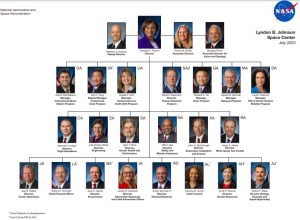Johnson Space Center (JSC)
Johnson Space Center (JSC) was established in 1961 as NASA’s Manned Spaceflight Center. The center has led many of NASA’s efforts in human space exploration, including the Gemini, Apollo, Skylab, Apollo-Soyuz, and Space Shuttle programs.[1]
Home to NASA’s astronaut corps, International Space Station Mission Operations, and the Orion Program; JSC is responsible for mission control and astronaut training.[2,3] Astronauts, mission support professionals, and engineers train at the Space Vehicle Mockup Facility. Astronauts also train at the Virtual Reality Laboratory, Neutral Buoyancy Laboratory at the Sonny Carter Training Facility, and Ellington Field.[4]
The Orion program’s spacecraft development, design, and testing are overseen by a team of engineers in addition to spacecraft manufacturing in Europe and across the country. This spacecraft is built for deep space travel, which includes the journey to Mars.
Known as the focal point of America’s human spaceflight programs, Johnson’s Christopher C. Kraft Jr. Mission Control Center is located at JSC. The Mission Control Center has been essential to all human spaceflight in the U.S. since the Gemini
IV mission. Flight control teams are stationed at all times, with permanent human presence aboard the International Space Station.[5] JSC is the lead center of the International Space Station. It coordinates the efforts of 16 nations worldwide that are involved in the ISS.[6]
Systems development, mission planning, research strategy, and integration and investment focus are provided by the Exploration Integration and Science Directorate. This directorate combines the necessary elements for planning and integrating human and robotics missions for exploration. The Human Research Program (HRP) is committed to safe and productive human space travel by discovering biomedical technologies and methods. This program is managed under the Exploration Integration and Science Directorate. NASA’S collection of extraterrestrial samples is curated by the Astromaterials Research and Exploration Science team. Applied science disciplines that are responsible for protecting operating spacecraft using imagery science and analysis, remote sensing, orbital debris environment characterization, spacecraft shielding designs, and spacecraft debris risk assessment are also housed by the Astromaterials Research and Exploration Science team.[7]
Source: NASA
Vanessa E. Wyche serves as the current director of the Johnson Space Center.
Information on doing business with JSC can be found here.
Updated October 2022, by Jackie Johnson


Comments are closed.